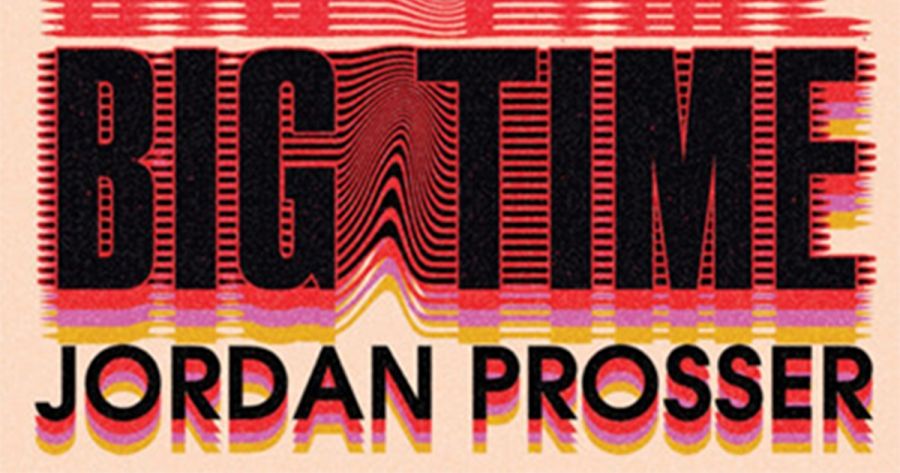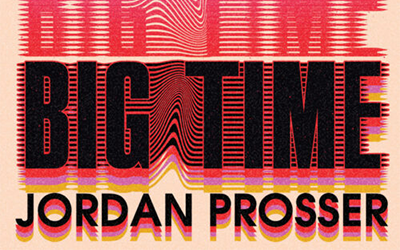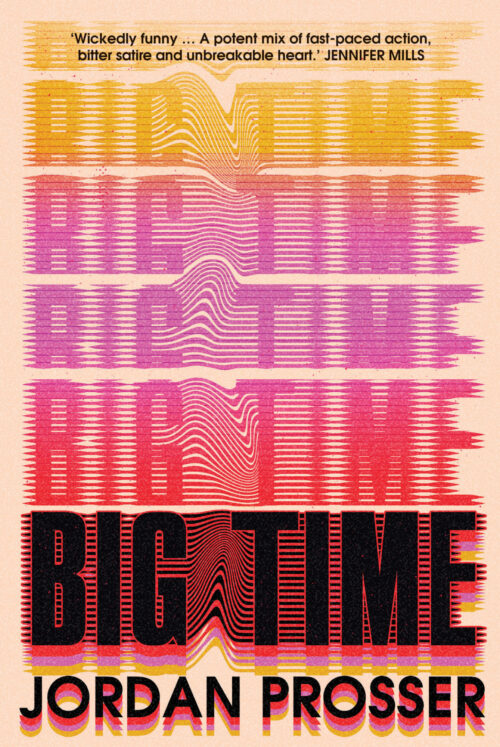
- Free Article: No
- Contents Category: Fiction
- Review Article: Yes
- Article Title: Futureshock
- Article Subtitle: Glimpsing the fullness of time
- Online Only: No
- Custom Highlight Text:
Given the global resurgence of interest in compounds such as psilocybin, LSD, and ayahuasca, it is a wonder more contemporary novelists have not turned to psychedelic experience for inspiration. It is, after all, hard to think of the golden age of psychedelics – roughly the mid-1960s to mid-1970s – without recalling the trippy, Zeitgeist-capturing literature it produced, including Hunter S. Thompson’s Fear and Loathing in Las Vegas (1971) and Tom Wolfe’s (highly fictionalised) Electric Kool-Aid Acid Test (1968).
- Featured Image (400px * 250px):

- Alt Tag (Featured Image): Ben Brooker review ‘Big Time’ by Jordan Prosser
- Book 1 Title: Big Time
- Book 1 Biblio: University of Queensland Press, $34.99 pb, 374 pp
- Book 1 Cover Small (400 x 600):

- Book 1 Cover (800 x 1200):

While mind-altering drugs continue to be strip mined for their usefulness in treating various mental health disorders alongside psychotherapy, Jordan Prosser’s first novel, Big Time, imagines a hallucinogenic drug – F, as in ‘future’ – as an aid of a different kind, one which facilitates a kind of mental time travel. Consumed as a liquid applied directly to the eyeballs, the drug plunges its takers into fully immersive trips which reveal their own and other people’s futures. Taken often enough and at sufficiently high doses, F allows users to skip ahead weeks or months. Of course, there are prices to be paid for the attainment of such valuable foreknowledge, not the least of which is a PTSD-like condition called ‘futureshock’.
It is sometime in the 2040s and Australia has become an autocracy following a series of domestic and international crises. The eastern states, renamed and redrawn, comprise the Federal Republic of East Australia (FREA) while Western Australia has (finally!) seceded. Draconian laws that had been ‘percolating for decades in the desk drawers of neoliberal apparatchiks’ have been passed by an unnamed, dictatorial Leader. The internet has been replaced with the state-controlled AusNet (not to be confused with an existing Australian energy company of the same name) and work camps constructed in remote areas. The borders are closed. Immigration and tourism are at negligible levels. ‘Whatever’s bad about it now was there before,’ one character observes of the country. ‘It just became the law of the land.’
Prosser lends these familiar Orwellian tropes an amusingly Australian inflection. FREA mines and exports coal in defiance of international trade sanctions. The local content on an in-house hotel cable channel includes ‘footy tipping, home renovation, paedophile hunting, docudramas about single-term prime ministers’. Big Time also differs from its dystopian predecessors in centring not on a single protagonist like Winston or Offred, but rather on an ensemble: the four members of the rock band The Acceptables, including bass player Julian, lead singer Ash, drummer Tammy, and guitarist Xander.
While the book’s perspective shifts, it is primarily narrated by Wesley, a music journalist trailing the band as they tour the country, work up new material, and draw the attention of a resistance group whose members include Oriana, Ash’s girlfriend. Of particular interest to the rebels is Julian’s use of F, his ability to trip through time almost at will, touted by resistance leader Charlie Total as ‘the defining spark to set the tinder box ablaze’.
In its telling, Big Time reminded me less of the major dystopias – Nineteen Eighty-Four (1949), The Handmaid’s Tale (1985) et al. – than of Ben Elton’s more speculative novels, such as Blind Faith (2007). Prosser’s prose, like Elton’s, is fast-paced and satirical, even when the object of its satire is less than apparent. It also invites comparison with the works of Kurt Vonnegut and Philip K. Dick, especially the latter’s Ubik (1969), which shares, among other elements, the plot device of time travel mediated by a chemical agent.
Its blurb describes Big Time as ‘anti-fascist’, but it is hard to see how that descriptor applies, except in the most general sense. Unlike in other dystopias, it is never clear what the guiding principles of Big Time’s authoritarian regime are, nor how the resistance relates to them ideologically. There are times when Prosser appears to be satirising the music industry – such as when The Acceptables’ management company is revealed to be using an algorithm to determine the viability of bands, as well as in his unflattering depiction of audiences single-mindedly interested in the hits – but if so, the critique never fully lands.
While Prosser is evidently a writer of imagination and ambition, Big Time is not without technical flaws typical of a début. There are sentences that clunk – ‘the two of them lurch gently as the plane fondles a pocket of turbulence’ – and perspective shifts that feel less like considered choices than narrative convenience. Perhaps the most egregious of these occurs during one scene that jarringly shifts from first to third person as Wesley exits the room, and the account of a conversation he is no longer privy to is suddenly taken up by an omniscient narrator.
There are other problems. The individual band members never feel fully fleshed out. Nor does the phenomenology of the F experience, despite a key plot element revolving around a ‘chronophenomenology’ summit. Also left underexplored are the temporal paradoxes F would surely give rise to. What becomes of debates concerning free will, determinism, and the nature of causality in this non-linear world? We can only guess. Perhaps, in a more oblique and less plot-driven novel, such details would feel less important, even irrelevant, but here they prove irksome.
Prosser is something of a renaissance man. I have long admired his criticism, and he directs and performs in addition to writing. But Big Time, like F itself, provides only a glimpse of what he might be capable of as a novelist in the fullness of time.


Comments powered by CComment